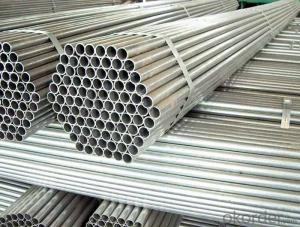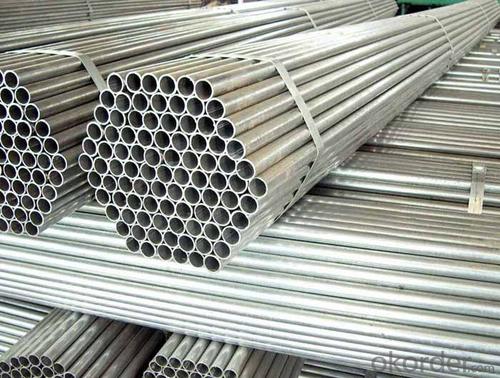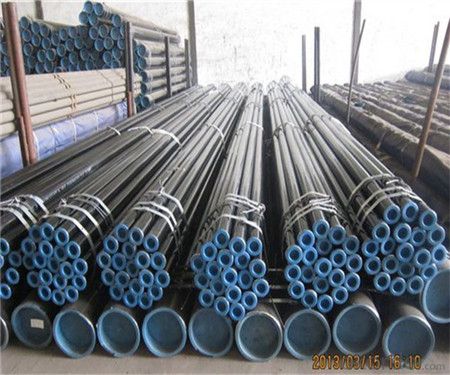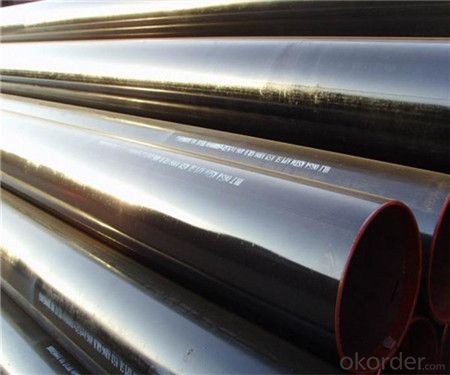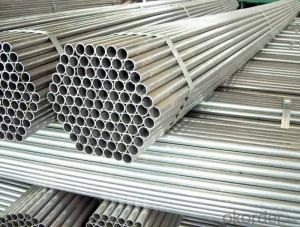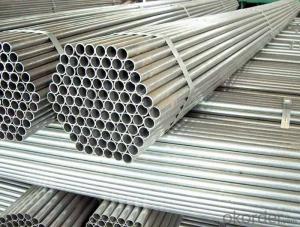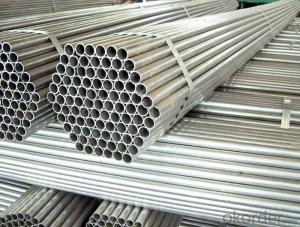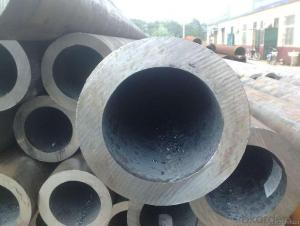Galvanized Steel Pipe API, ASTM, DIN, JIS
- Loading Port:
- Tianjin
- Payment Terms:
- TT or LC
- Min Order Qty:
- 20 m.t.
- Supply Capability:
- 15000 m.t./month
OKorder Service Pledge
OKorder Financial Service
You Might Also Like
1、Structure of Galvanized Steel Pipe API, ASTM, DIN, JIS:
Seamless pipe is formed by drawing a solid billet over a piercing rod to create the hollow shell. As the manufacturing process does not include any welding, seamless pipes are perceived to be stronger and more reliable. Historically seamless pipe was regarded as withstanding pressure better than other types, and was often more easily available than welded pipe. 。
2、Main Features of Galvanized Steel Pipe API, ASTM, DIN, JIS:
• High manufacturing accuracy
• High strength
• Small inertia resistance
• Strong heat dissipation ability
• Good visual effect
• Reasonable price
3、Galvanized Steel Pipe API, ASTM, DIN, JIS Specification:
Standard | GB, DIN, ASTM ASTM A106-2006, ASTM A53-2007 |
Grade | 10#-45#, 16Mn 10#, 20#, 45#, 16Mn |
Thickness | 8 - 33 mm |
Section Shape | Round |
Outer Diameter | 133 - 219 mm |
Place of Origin | Shandong, China (Mainland) |
Secondary Or Not | Non-secondary |
Application | Hydraulic Pipe |
Technique | Cold Drawn |
Certification | API |
Surface Treatment | factory state or painted black |
Special Pipe | API Pipe |
Alloy Or Not | Non-alloy |
Length | 5-12M |
Outer Diameter | 21.3-610mm |
Grade | 20#, 45#, Q345, API J55, API K55, API L80, API N80, API P110, A53B |
Standard | ASME, ASTM |
1) Material:20#(ASTM A 106/A53 GRB.API5LGRB,GB),45#,16Mn,10#.
2) Specification range:OD:21.3-610mm,WT:6-70mm,length:6-12m or according to the requirement of clients.
3) Excutive standards:GB,ASME API5L.ASTM A 106/A53,Despite of the above standards,we can also supply seamless steel pipe with standard of DIN,JIS,and so on,and also develop new products according to the requirements of our clients!
4) Surface:black lacquered,varnish coating or galvanized.
5) Ends:Beveled or square cut,plastic capped,painted.
6) Packing:bundles wrapped with strong steel strip,seaworthy packing.
4、Packaging & Delivery
Packaging Details: | seaworthy package,bundles wrapped with strong steel strip |
Delivery Detail: | 15-30days after received 30%TT |
5、FAQ of Galvanized Steel Pipe API, ASTM, DIN, JIS:
①How is the quality of your products?
Our products are manufactured strictly according to national and internaional standard, and we take a test
on every pipe before delivered out. If you want see our quality certifications and all kinds of testing report, please just ask us for it.
Guaranteed: If products’ quality don’t accord to discription as we give or the promise before you place order, we promise 100% refund.
②How about price?
Yes, we are factory and be able to give you lowest price below market one, and we have a policy that “ for saving time and absolutely honest business attitude, we quote as lowest as possible for any customer, and discount can be given according to quantity”,if you like bargain and factory price is not low enough as you think, just don’t waste your time.Please trust the quotation we would give you, it is professional one.
③Why should you chose us?
Chose happens because of quality, then price, We can give you both.Additionally, we can also offer professional products inquiry, products knowledge train(for agents), smooth goods delivery, exellent customer solution proposals.Our service formula: good quality+good price+good service=customer’s trust
SGS test is available, customer inspection before shipping is welcome, third party inspection is no problem.
6、Galvanized Steel Pipe API, ASTM, DIN, JIS Images:
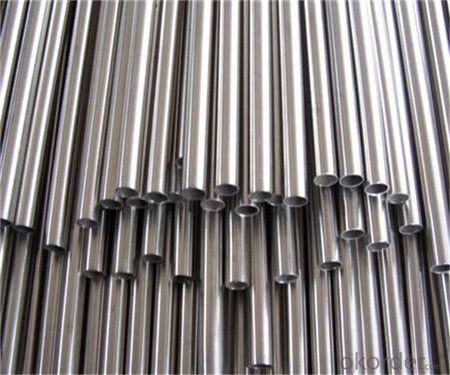
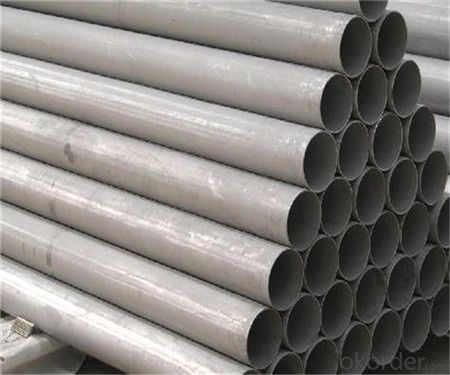
- Q: What are the different types of hangers used for supporting steel pipes?
- Supporting steel pipes requires the use of various hangers, each with its own distinctive design and purpose. Some commonly used types include: 1. Clevis Hangers: These hangers consist of a U-shaped loop that attaches to a support structure using a threaded rod. The pipe is then secured in place with a bolt. Clevis hangers are ideal for vertical pipe runs and provide excellent stability and support. 2. Split Ring Hangers: Designed with a split ring that wraps around the pipe, these hangers can be easily installed and adjusted. They are suitable for different pipe sizes and applications. 3. Pipe Clamps: Simple and versatile, pipe clamps consist of a metal clamp that wraps around the pipe and is secured to a support structure using screws or bolts. They come in various designs to accommodate different pipe sizes and ensure stability. 4. Beam Clamps: These hangers are specifically designed for overhead support beams or structures. They feature a clamp that wraps around the beam and attaches to the pipe using a threaded rod or bolt. Beam clamps are commonly used in industrial and commercial settings for horizontal pipe runs. 5. Roller Hangers: When pipe movement is necessary due to thermal expansion or contraction, roller hangers are used. They allow the pipe to move freely while still providing support, making them suitable for long pipe runs or areas with significant temperature variations. 6. Spring Hangers: Designed to support pipes and absorb vibrations or shocks, spring hangers consist of a spring element attached to a support structure and a rod or rod assembly that supports the pipe. They are often used to reduce noise or prevent damage caused by vibrations. These examples represent just a few of the hangers available for supporting steel pipes. The selection of a hanger depends on factors such as pipe size, weight, location, and specific installation requirements. It is recommended to consult with a professional or engineer to ensure the appropriate hangers are chosen for each specific application.
- Q: What is the maximum diameter of steel pipes?
- The maximum diameter of steel pipes can vary depending on the specific needs and requirements of a project. However, steel pipes are commonly available in diameters ranging from 1/8 inch to 72 inches or even larger.
- Q: How are steel pipes protected during transportation and storage?
- Steel pipes are typically protected during transportation and storage through various measures. These include using protective coatings like oil or paint to prevent corrosion, using proper packaging materials such as plastic caps or wrapping, securing them with straps or bands to prevent movement and damage, and storing them in covered or enclosed areas to shield them from environmental elements like moisture, sunlight, or extreme temperatures.
- Q: What are the different types of steel pipe joints for underwater applications?
- Some different types of steel pipe joints for underwater applications include flanged joints, welded joints, and mechanical joints. Flanged joints involve connecting pipes by bolting together flanges at the ends. Welded joints are created by fusing the ends of pipes together using heat and pressure. Mechanical joints use couplings or connectors to join pipes together, typically with rubber seals to ensure a watertight connection.
- Q: What is the maximum temperature and pressure that steel pipes can withstand?
- The maximum temperature and pressure that steel pipes can withstand depend on various factors such as the grade of steel, wall thickness, and intended application. However, in general, steel pipes can typically withstand temperatures up to 1000-1200°C (1800-2200°F) and pressures ranging from 1000-5000 psi (6.9-34.5 MPa). It is important to consult specific industry standards and engineering guidelines for accurate information based on the specific steel grade and application.
- Q: How are steel pipes used in the manufacturing of agricultural machinery?
- Steel pipes are commonly used in the manufacturing of agricultural machinery as they are strong, durable, and resistant to corrosion. They are used to create the framework and structural components of various agricultural equipment such as plows, tillers, planters, and harvesters. Steel pipes provide stability and strength to these machines, allowing them to withstand heavy loads and operate efficiently in tough farming conditions.
- Q: How are steel pipes used in underground drainage systems?
- Steel pipes are commonly used in underground drainage systems to transport wastewater and stormwater away from buildings and infrastructure. These pipes are durable and resistant to corrosion, making them suitable for underground applications. They are typically used for main sewer lines and stormwater drains, providing a reliable and long-lasting solution for effective drainage.
- Q: How do you calculate the pipe flow velocity for steel pipes?
- To calculate the pipe flow velocity for steel pipes, you can use the formula: Velocity = (Flow rate / (π * (Diameter/2)^2)). This equation takes into account the flow rate of the fluid through the pipe and the diameter of the steel pipe.
- Q: What is the thickness of steel pipes?
- The thickness of steel pipes can vary depending on the specific application and industry requirements. However, typical steel pipes used in various industries, such as construction and oil and gas, can have thicknesses ranging from a few millimeters to several centimeters.
- Q: What is the role of steel pipes in the transportation of chemicals?
- The role of steel pipes in the transportation of chemicals is to provide a safe and reliable means of transporting various types of chemicals over long distances. Steel pipes are highly resistant to corrosion, which is crucial when dealing with corrosive chemicals. They are also strong and durable, ensuring that the pipes can withstand the pressure and weight of the chemicals being transported. Additionally, steel pipes are able to maintain the integrity of the chemicals, preventing any leakage or contamination during transportation. Overall, steel pipes play a vital role in ensuring the efficient and secure transportation of chemicals.
Send your message to us
Galvanized Steel Pipe API, ASTM, DIN, JIS
- Loading Port:
- Tianjin
- Payment Terms:
- TT or LC
- Min Order Qty:
- 20 m.t.
- Supply Capability:
- 15000 m.t./month
OKorder Service Pledge
OKorder Financial Service
Similar products
Hot products
Hot Searches
Related keywords
